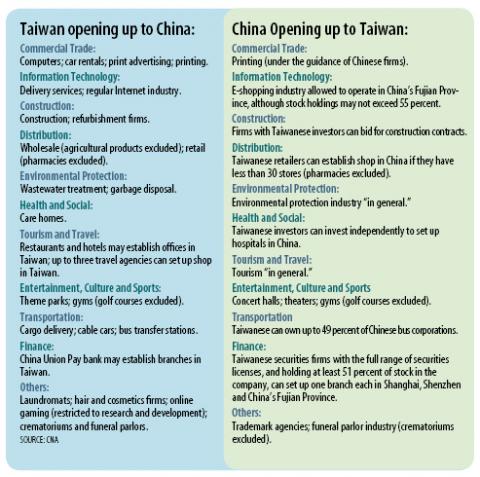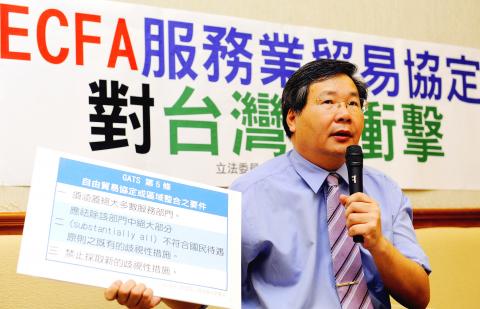|
SERVICES PACT: TSU
knocks cross-strait service trade agreement
TRIGGERING A BOYCOTT: The TSU said the benefits
the pact might bring to major conglomerates would come at the expense of small
and medium-sized enterprises
By Shih Hsiu-chuan / Staff reporter

GRAPHIC: TT

Taiwan Solidarity Union
legislative caucus whip Hsu Chung-hsin criticizes the government at a press
conference in Taipei yesterday for what he says is its failure to explain the
impact of the service trade agreement on Taiwan’s service industry.
Photo: George Tsorng, Taipei Times
The signing of a service trade agreement
with China could affect issues on the legislature’s agenda during the extra
session this week, after the Taiwan Solidarity Union (TSU) yesterday vowed to
block all proceedings in the remaining four days.
TSU legislative caucus whip Hsu Chung-hsin (許忠信) told a press conference that
the trade pact would subject local businesses to fierce competition, bring in
white-collar Chinese workers, and lead to an outflow of Taiwanese expertise and
knowledge to China.
The service trade agreement is one of the follow-up agreements to the Economic
Cooperation Framework Agreement (ECFA) which came into effect in July 2010.
Although there are more stringent restrictions on Chinese investments in certain
industries covered by the service trade agreement, under WTO rules, those
safeguards will have to be lifted after the end of the interim period of 10
years following the ECFA’s signing, Hsu said.
“From then on, Taiwan will be wide open to China” because limiting the number of
China-funded firms, share holdings, scope of business activities and recruitment
of Chinese employees would be considered a violation of the core principles of
the WTO, Hsu said.
Under the agreement, China would open 80 service sectors to Taiwan, while Taiwan
would open 64 sectors to China. The sectors include those related to commerce,
telecommunications, construction, distribution, the environment, health,
tourism, entertainment, culture, sports, transportation and finance.
The wide range of industries covered by the trade pact was not made public until
the agreement was signed at 2pm on Friday in Shanghai.
Hsu said that financial conglomerates would benefit from the agreement because
the pact would facilitate access to the Chinese banking, insurance and
securities markets, but that will “come at the expense of the majority of small
and medium-sized enterprises and workers in Taiwan.”
The TSU demanded that Premier Jiang Yi-huah (江宜樺) present the pact before the
legislature to discuss with lawmakers how it would affect the nation, and that
the deal should take effect only after the legislature approves it.
The TSU will boycott the remaining days of the extra session scheduled for next
month to force the Chinese Nationalist Party (KMT) to agree to its demands, Hsu
said.
During the session, the KMT had expected to pass an amendment to the Income Tax
Act (所得稅法) to scrap the 8,500-point TAIEX threshold that automatically triggers
the imposition of the tax on most individual investors. It also wants to pass a
proposed referendum on the Fourth Nuclear Power Plant in New Taipei City’s (新北市)
Gongliao District (貢寮) as well as clearing a number of other bills before the
extra session ends on Thursday.
The KMT also considers the draft senior secondary education act (高級中等教育法) as
urgent, considering the limited time left to prepare for the planned 12-year
education scheme, set to begin in August next year.
Lawmakers across party lines on Friday called for a full and detailed
examination of the signed service trade pact, with the opposition demanding that
the legislature examine the deal thoroughly before deciding whether to allow it
to go into effect.
KMT caucus whip Lin Hung-chih (林鴻池) yesterday said his party was not opposed to
a review of the agreement by the legislature, but did not consider it necessary
that Jiang present it at a question-and-answer session with lawmakers.
Lin said the KMT hoped the bills that were scheduled to be dealt with this week
would not be delayed by the service trade pact issue.
Democratic Progressive Party (DPP) caucus whip Ker Chien-ming (柯建銘) asked
President Ma Ying-jeou (馬英九) to step forward to address the public’s concerns.
Ker said the DPP would otherwise boycott a review of the agreement and demanded
that the agreement be overruled and that Taiwan restart negotiations with China
over the opening up of the service sector.
|
![]()
![]()
![]()